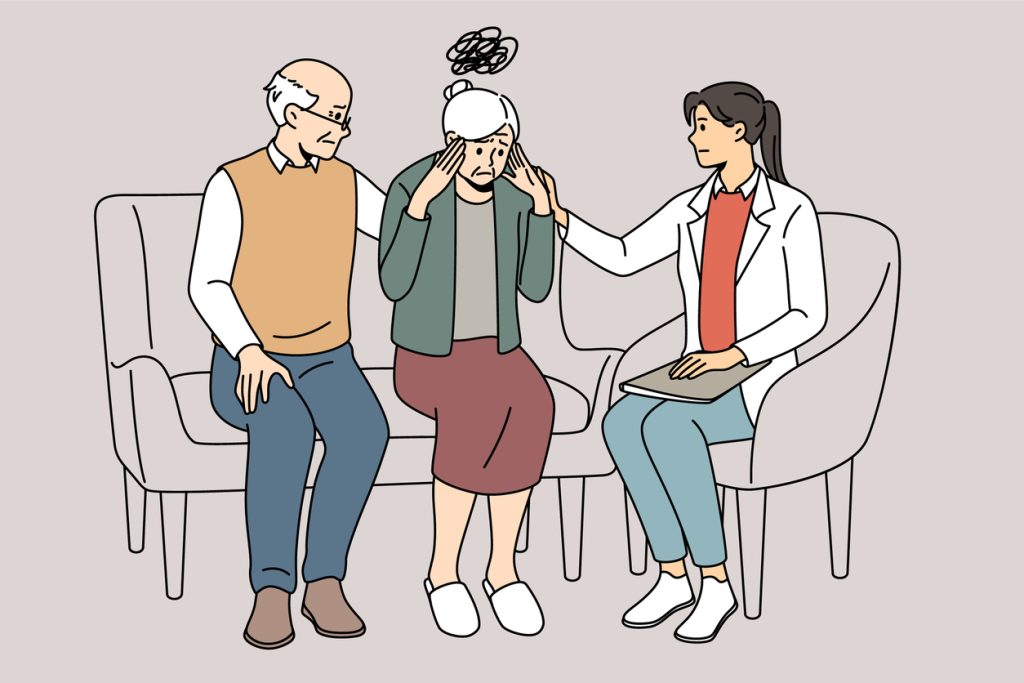Dementia is a general term used to describe a decline in cognitive function that interferes with daily life. It’s not a single disease but rather a set of symptoms caused by various conditions that affect the brain. In the United States, millions of people—particularly older adults—live with some form of dementia, making it one of the most pressing public health concerns for aging populations. Understanding what dementia is, how it progresses, and what can be done to manage it is essential for individuals, caregivers, and families.

What Is Dementia?
Dementia involves a persistent loss of memory, thinking, problem-solving, language, and other mental abilities that are severe enough to impact a person’s ability to function independently. While memory loss is a common early symptom, dementia can also affect mood, personality, and behavior.
There are several types of dementia, with Alzheimer’s disease being the most common, accounting for 60% to 80% of cases. Other types include vascular dementia, Lewy body dementia, frontotemporal dementia, and mixed dementia, where a person may exhibit signs of more than one type. The causes and progression of each type vary, but all forms ultimately result in progressive brain cell damage.
Symptoms of Dementia
Dementia symptoms usually develop gradually and worsen over time. Common signs include:
- Short-term memory loss
- Difficulty finding words or following conversations
- Confusion about time or place
- Difficulty with problem-solving or completing familiar tasks
- Poor judgment and decision-making
- Personality changes or mood swings
- Withdrawal from work or social activities
In advanced stages, individuals may lose the ability to communicate, recognize loved ones, or care for themselves.
It is important to note that occasional forgetfulness or confusion does not mean someone has dementia. A proper medical evaluation is necessary to determine the cause of cognitive decline.
Risk Factors and Causes
Dementia primarily affects older adults, though it is not a normal part of aging. Several factors can increase the risk:
- Age: Risk increases significantly after age 65
- Family history: Genetic predisposition plays a role, especially in early-onset cases
- Cardiovascular health: Conditions like high blood pressure, diabetes, and stroke can increase the risk
- Lifestyle: Smoking, excessive alcohol use, poor diet, and physical inactivity may contribute
- Head trauma: Severe or repeated brain injuries can raise the likelihood of developing dementia
Some types of dementia are caused by specific brain diseases or structural issues in the brain, and certain medications, infections, or vitamin deficiencies can mimic dementia symptoms, making early evaluation critical.
Diagnosis and Evaluation
In the U.S., dementia is typically diagnosed by a primary care physician, neurologist, or geriatric specialist. Diagnosis involves:
- A thorough medical history
- Cognitive and neurological testing
- Blood tests to rule out other conditions
- Brain imaging, such as MRI or CT scans
- Interviews with family members or caregivers
Early diagnosis is essential because it allows patients and families time to plan for the future, begin treatment, and access support services.
Treatment Options
There is currently no cure for most forms of dementia, but treatments can help slow the progression of symptoms and improve quality of life. Medications such as cholinesterase inhibitors (donepezil, rivastigmine) and memantine are commonly prescribed for Alzheimer’s disease. These drugs may help improve memory and daily functioning, especially in early to moderate stages.
Non-drug therapies, such as cognitive stimulation, occupational therapy, music therapy, and exercise programs, can also help manage symptoms and improve emotional well-being. Creating a structured routine, maintaining a calm environment, and engaging in enjoyable activities can make daily life more manageable for those with dementia.
Caregiving and Support
Caring for someone with dementia can be emotionally and physically challenging. In the U.S., most dementia care is provided at home by family members, who often need support and guidance. Caregivers may face stress, burnout, and health problems of their own. Seeking help through local Alzheimer’s Association chapters, adult day care programs, and respite services can provide much-needed relief.
It’s also important to plan for the future by discussing legal and financial matters early, including power of attorney, advance directives, and long-term care preferences. Many families also consider assisted living or memory care facilities when home care becomes too demanding.
Preventing Dementia: Is It Possible?
While there is no guaranteed way to prevent dementia, research suggests that a healthy lifestyle can reduce risk. Strategies include:
- Regular physical exercise, especially aerobic activities
- A heart-healthy diet, such as the Mediterranean or DASH diet
- Keeping the mind active through learning and social interaction
- Managing chronic conditions like high blood pressure and diabetes
- Not smoking and limiting alcohol intake
- Getting adequate sleep and treating sleep disorders
These habits support overall brain health and may delay or reduce the impact of cognitive decline.
